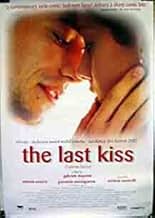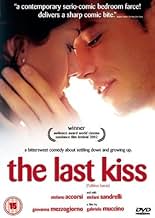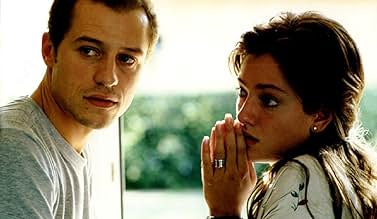IMDb रेटिंग
6.9/10
9 हज़ार
आपकी रेटिंग
अपनी भाषा में प्लॉट जोड़ेंCarlo's life is thrown into a tailspin when his longtime girlfriend Giulia announces she's pregnant. As Carlo faces up to his anxieties about adulthood, his buddies Paolo, Adriano and Albert... सभी पढ़ेंCarlo's life is thrown into a tailspin when his longtime girlfriend Giulia announces she's pregnant. As Carlo faces up to his anxieties about adulthood, his buddies Paolo, Adriano and Alberto reluctantly grapple with their own responsibilities.Carlo's life is thrown into a tailspin when his longtime girlfriend Giulia announces she's pregnant. As Carlo faces up to his anxieties about adulthood, his buddies Paolo, Adriano and Alberto reluctantly grapple with their own responsibilities.
- पुरस्कार
- 16 जीत और कुल 14 नामांकन
Pierfrancesco Favino
- Marco
- (as Pier Francesco Favino)
फ़ीचर्ड समीक्षाएं
'The Last Kiss' is a beautiful Italian film, a romantic comedy and drama told in multiple storylines reminiscent of 'Magnolia' or 'Short Cuts'. It is one of the best films ever to deal with twenty-something males who haven't really grown up and accepted the responsibility of an adult life, and also about the women who have to deal with them. Most of the men in this film have commitment-phobia. Babies are being had, weddings are taking place, apartments are being purchased, but all these men can think about is escape. They are planning on buying a beat up old van and traveling the world in search of an adventure. Anything will do, as long as it doesn't involve growing up, becoming an adult and assuming responsibility for the direction of their lives and relationships.
It sounds weighty and significant. Perhaps it is. But the movie is so effortless, lighthearted, energetic and funny that time seems to fly by. It is one of the most entertaining films of the year. It's no wonder that 'The Last Kiss' won so many Audience Awards at film festivals in 2002, including at Sundance. The film also became one of the biggest box office successes in European cinema history. This film, which Peter Travers of Rolling Stone called "Sex in the City with men", garnered tons of 3½ and 4 star reviews, hit dozens of Top Ten Lists, and will easily become a favorite for those who are lucky enough to see it.
The performances are all stellar. The primary couple in the film, supremely played by Stefano Accorsi (Carlo) and Giovanna Mezzogiorno (Giulia), are fascinating to watch. They are emotionally polar opposites at different stages in their lives. The film builds around this couple and the explosive crescendo that seems imminent from the opening scenes. Carlo is immature and irresponsible. Giulia is calm, methodical and assured in her wants and needs. She loves Carlo, despite his flaws, but tells him that the one thing she won't abide is infidelity. Needless to say, the temptations present themselves during the film and we get to watch one of the most explosive arguments in the history of cinema as Giulia has a melt down when she finds out the truth.
The film dances around to other storylines from time to time, but it always returns to the central couple. All the other vignettes are interesting but serve primarily as breathers and changes-of-pace. You won't be as invested in those characters as you will be with Carlo and Giulia. Giovanna Mezzogiorno is spectacular here. She bounces effortlessly between calm and rage, trust and jealousy, romantic and pragmatic. It is one of the best performances of the decade. Special note must also be given to a new Italian starlet named Martina Stella, who is vibrant and mesmerizing as the object of Carlo's lust. She plays a love-struck young girl named Francesca, who is so painfully unaware of life's cruel hardships and realities. Her naiveté and wide-eyed innocence makes it easy for us to understand why Carlo might stray. Martina Stella is a wonderful new talent that we should keep our eyes on over the next few years.
I pointed out the structural similarity to Paul Thomas Anderson's 1999 masterpiece, 'Magnolia'. However, there is more than just a passing resemblance. 'The Last Kiss' is obviously inspired by it's predecessor. It looks and sounds a great deal like that classic. The camera movement is energetic and dynamic. There are a ton of complex 'steadicam' scenes. The score is that anticipatory and frenetic string ensemble that allows us to flow from moment to moment as the editing shifts us from one storyline to another. In fact, the scores are so similar that I initially thought it had been borrowed. The way I see things, if you are going to emulate a film, you can't do much better than emulating 'Magnolia'.
This film has the ability to make you laugh and cry with the absolute recognition of your own life . There are so many scenes that will hit home. Virtually every viewer over the age of 25 will be able to see themselves, at some point in their life, manifested in one of these characters. It is a witty and observant script that deals truthfully and hysterically with the complexities of modern relationships. I think that is the main reason it has become a fan favorite.
The cinematography and lighting are first rate. These stunningly gorgeous Italian thespians are made even more resplendent than previously imaginable. Gabriele Muccino directs the film and seems to make every single shot count. You could take any still-frame from this movie and have a photograph to hang in an art gallery.
I've already mentioned the wonderful score, but I would also like to point out another lovely sound in this film... the Italian language. Never before have so many words been crammed into a two hour movie. It is a lovely language to behold. It sounds beautiful whether it is being whispered or screamed. I know it may seem a little meaningless to state such a thing, but I believe that a great film can be enjoyed with either the sound or the picture off. This film assuredly looks gorgeous, but it sounds even better!
There are many things to love about this film. Giovanna Mezzogiorno's performance is miraculous. The stories are poignantly truthful. The character arcs are rich and full and complete. The technical aspects of the film are immaculate. The resolution is satisfying and honest. You will cringe, you will laugh, you will be joyous and angry... this movie will take you on an emotional roller-coaster. You will almost feel Italian (If you aren't already). And the final few moments of the film will leave you smirking to yourself as you contemplate the resounding irony of it all. How cruel these directors can be!
'The Last Kiss' (L'Ultimo Bacio) is easily one of the best films of the year. I suggest you make a special effort to seek this film out... you won't regret it.
It sounds weighty and significant. Perhaps it is. But the movie is so effortless, lighthearted, energetic and funny that time seems to fly by. It is one of the most entertaining films of the year. It's no wonder that 'The Last Kiss' won so many Audience Awards at film festivals in 2002, including at Sundance. The film also became one of the biggest box office successes in European cinema history. This film, which Peter Travers of Rolling Stone called "Sex in the City with men", garnered tons of 3½ and 4 star reviews, hit dozens of Top Ten Lists, and will easily become a favorite for those who are lucky enough to see it.
The performances are all stellar. The primary couple in the film, supremely played by Stefano Accorsi (Carlo) and Giovanna Mezzogiorno (Giulia), are fascinating to watch. They are emotionally polar opposites at different stages in their lives. The film builds around this couple and the explosive crescendo that seems imminent from the opening scenes. Carlo is immature and irresponsible. Giulia is calm, methodical and assured in her wants and needs. She loves Carlo, despite his flaws, but tells him that the one thing she won't abide is infidelity. Needless to say, the temptations present themselves during the film and we get to watch one of the most explosive arguments in the history of cinema as Giulia has a melt down when she finds out the truth.
The film dances around to other storylines from time to time, but it always returns to the central couple. All the other vignettes are interesting but serve primarily as breathers and changes-of-pace. You won't be as invested in those characters as you will be with Carlo and Giulia. Giovanna Mezzogiorno is spectacular here. She bounces effortlessly between calm and rage, trust and jealousy, romantic and pragmatic. It is one of the best performances of the decade. Special note must also be given to a new Italian starlet named Martina Stella, who is vibrant and mesmerizing as the object of Carlo's lust. She plays a love-struck young girl named Francesca, who is so painfully unaware of life's cruel hardships and realities. Her naiveté and wide-eyed innocence makes it easy for us to understand why Carlo might stray. Martina Stella is a wonderful new talent that we should keep our eyes on over the next few years.
I pointed out the structural similarity to Paul Thomas Anderson's 1999 masterpiece, 'Magnolia'. However, there is more than just a passing resemblance. 'The Last Kiss' is obviously inspired by it's predecessor. It looks and sounds a great deal like that classic. The camera movement is energetic and dynamic. There are a ton of complex 'steadicam' scenes. The score is that anticipatory and frenetic string ensemble that allows us to flow from moment to moment as the editing shifts us from one storyline to another. In fact, the scores are so similar that I initially thought it had been borrowed. The way I see things, if you are going to emulate a film, you can't do much better than emulating 'Magnolia'.
This film has the ability to make you laugh and cry with the absolute recognition of your own life . There are so many scenes that will hit home. Virtually every viewer over the age of 25 will be able to see themselves, at some point in their life, manifested in one of these characters. It is a witty and observant script that deals truthfully and hysterically with the complexities of modern relationships. I think that is the main reason it has become a fan favorite.
The cinematography and lighting are first rate. These stunningly gorgeous Italian thespians are made even more resplendent than previously imaginable. Gabriele Muccino directs the film and seems to make every single shot count. You could take any still-frame from this movie and have a photograph to hang in an art gallery.
I've already mentioned the wonderful score, but I would also like to point out another lovely sound in this film... the Italian language. Never before have so many words been crammed into a two hour movie. It is a lovely language to behold. It sounds beautiful whether it is being whispered or screamed. I know it may seem a little meaningless to state such a thing, but I believe that a great film can be enjoyed with either the sound or the picture off. This film assuredly looks gorgeous, but it sounds even better!
There are many things to love about this film. Giovanna Mezzogiorno's performance is miraculous. The stories are poignantly truthful. The character arcs are rich and full and complete. The technical aspects of the film are immaculate. The resolution is satisfying and honest. You will cringe, you will laugh, you will be joyous and angry... this movie will take you on an emotional roller-coaster. You will almost feel Italian (If you aren't already). And the final few moments of the film will leave you smirking to yourself as you contemplate the resounding irony of it all. How cruel these directors can be!
'The Last Kiss' (L'Ultimo Bacio) is easily one of the best films of the year. I suggest you make a special effort to seek this film out... you won't regret it.
[s p o i l e r s]
You have to admit there's much that's life affirming and technically accomplished in Gabriele Muccino's movies about superficial Italians coupling and uncoupling. His scenes never stop moving, and his camera has learned to keep up with the flow. Undoubtedly his most polished effort so far is L'ultimo bacio (The Last Kiss). A box office success in Italy and abroad (though not a critical one), The Last Kiss is a splendid operatic swirl of melodramatic ensemble acting and liquid editing. Its succession of slick, fast-talking, emotional roller coaster scenes is a beautiful thing to watch. It's got irresistible rhythm if you don't mind that the high energy leads to an awful lot of yelling. The episodic structure and musical links may owe something to P.T. Anderson's Magnolia; but this is Italy and it all works differently. It isn't about anomie and chance encounters: everyone's connected. The Last Kiss is a well-oiled machine with jaw-dropping energy.
Its action is so lively, its motion so perpetual, you may fail to notice what a stagnant society The Last Kiss represents - how complacent the characters and their creator are. The way they buckle down and accept the mind-numbing `comforts' and intellectual limitations of Berlusconi's Italy. It's a place they all seem destined to accept as the best of all possible worlds.
The Last Kiss revolves (almost literally: the steadicam pans from scene to scene while operatic music swims across the transitions) around five young men about to turn thirty in a provincial town. At the center is Carlo (Stefano Accorsi). His fiancée Giulia (Giovanna Mezzogiorno) is pregnant and he can't face the prospect of a wife, a child, and a house. He's not ready to grow up. Most of Carlo's buddies have the same problem. Paolo (Claudio Santamaria) goes through the death of his father right after he's had an angry breakup with his girlfriend, and he can't face going into the family religious object business. The mercurial Adriano (Giorgio Casotti) has a young child and a ball-buster wife (Livia, Sabrina Impacciatore) and these challenges have him fed up with his marriage and ready to leave it. Alberto (Marco Cocci), a dreadlocked, joint-smoking Greenpeace hippy, amuses himself seeing how many women will jump into bed with him; he's a sciupafemmine, a Don Juan who chews them up and spits them out: marriage is not on his horizon.
But Marco (Pierfrancesco Favino) is getting married: he's buying into the normal life. Marco's four friends are all at Marco's wedding, and it's there that Carlo meets Francesca (Martina Stella), a tantalizingly delicious blonde schoolgirl who successfully puts the make on him. Meanwhile Giulia's mother Anna (a simpatica Stefania Sandrelli) is fed up with her taciturn psychiatrist husband Emilio (Luigi Emilio) and goes through her own period of rebellion, trying to revive an affair of three years ago with a college professor (Sergio Castellitto).
Carlo gets his wild night with Francesca, his `last kiss' which turns into more than that after Giulia finds out and they have a big fight (where the movie's yell-fest reaches fortissimo). He runs back and sleeps with the 18-year old, and then spends the rest of the movie trying to patch things up and get his life back on its track. Meanwhile Adriano, Alberto, and Paolo are planning to run off to Africa, or somewhere-an escape that's really a last fling: but their whole series of tantrums and complaints are background noise, an obligato to the main themes. The focus is on Giulia's mother, Adriano, and Carlo. Where the movie is really headed for its finale is to Carlo and Giulia reuniting, and a soothing voiceover from Carlo about how nice it will be to have grass and a suburban house and kids. . .and all the rest, and the two of them are reconciled at her parents' house where Anna is back with her father. It seems that Adriano really has left his wife, for a while anyway, but that subject is dropped.
Closely examined, despite its Magnolia-like intercutting of related subplots, its splendid cast and beautiful look, The Last Kiss reveals a worldview that's numbingly vapid. Its young men on the verge of thirty and one older woman in revolt against the ordinary paths they've chosen only play at escape: the final sequence is a corny affirmation of comfortable bourgeois family life, big house, big car, perfect bambini. Anna is back with Giulia's father. Her little revolt is over.
What is the theme that unifies Muccino's movies? Is it coming of age, as in Come te nessuno mai, or is it playing at revolution, as in that same rather charming first film about high schoolers staging a Sixties-style strike while what the boys really want is only to get laid? If Come te is Muccino's freshest and most unassuming effort, Ricordati di me, his most recent one, is his cheesiest: again, a swirl of stories about individuals in a family who are all in revolt against their lives - and come back to conventionality at the end - but with much tackier subplots. He's made a trilogy: (1) first sex, (2) last infidelity before marriage, (3) first infidelity after, with being aTV go-go dancer treated as a viable life choice. The theme is simply: revolt a little, it'll make you feel better. `Normality is the true revolution.'
Italians who remember the great directors of the past shake their heads at such stuff. The idea that all temptations to rebel end in a little reconciliation is complacent even for TV sitcoms. It's as if Muccino has all this promise as a filmmaker - he can orchestrate his subplots in such an entertaining way and the editing is inspired - he's a real Robert Altman with a Tuscan accent - but his head is too empty; there's no there there.
Muccino's characters, for all their charm and good looks, are pretty silly people. Carlo, Last Kiss's main character, is attractive in his way but his shit-faced grin palls: he's an airhead to be tempted by Francesca, the blonde Lolita, because she's an airhead too, just a pretty schoolgirl who confuses wanting to get laid with finding the love of her life. There's no edge to the temptation, because Francesca's pull on Carlo was so superficial. It's lively and glossy and it has moments of flirting with satire and farce, the sheer energy of it can be lots of fun to watch, but when you get down to it, Last Kiss is on the level of a TV sitcom. In fact American cable network dramas arguably go deeper than this. Is Muccino the best that mainstream Italian cinema can now produce? Let's hope not.
You have to admit there's much that's life affirming and technically accomplished in Gabriele Muccino's movies about superficial Italians coupling and uncoupling. His scenes never stop moving, and his camera has learned to keep up with the flow. Undoubtedly his most polished effort so far is L'ultimo bacio (The Last Kiss). A box office success in Italy and abroad (though not a critical one), The Last Kiss is a splendid operatic swirl of melodramatic ensemble acting and liquid editing. Its succession of slick, fast-talking, emotional roller coaster scenes is a beautiful thing to watch. It's got irresistible rhythm if you don't mind that the high energy leads to an awful lot of yelling. The episodic structure and musical links may owe something to P.T. Anderson's Magnolia; but this is Italy and it all works differently. It isn't about anomie and chance encounters: everyone's connected. The Last Kiss is a well-oiled machine with jaw-dropping energy.
Its action is so lively, its motion so perpetual, you may fail to notice what a stagnant society The Last Kiss represents - how complacent the characters and their creator are. The way they buckle down and accept the mind-numbing `comforts' and intellectual limitations of Berlusconi's Italy. It's a place they all seem destined to accept as the best of all possible worlds.
The Last Kiss revolves (almost literally: the steadicam pans from scene to scene while operatic music swims across the transitions) around five young men about to turn thirty in a provincial town. At the center is Carlo (Stefano Accorsi). His fiancée Giulia (Giovanna Mezzogiorno) is pregnant and he can't face the prospect of a wife, a child, and a house. He's not ready to grow up. Most of Carlo's buddies have the same problem. Paolo (Claudio Santamaria) goes through the death of his father right after he's had an angry breakup with his girlfriend, and he can't face going into the family religious object business. The mercurial Adriano (Giorgio Casotti) has a young child and a ball-buster wife (Livia, Sabrina Impacciatore) and these challenges have him fed up with his marriage and ready to leave it. Alberto (Marco Cocci), a dreadlocked, joint-smoking Greenpeace hippy, amuses himself seeing how many women will jump into bed with him; he's a sciupafemmine, a Don Juan who chews them up and spits them out: marriage is not on his horizon.
But Marco (Pierfrancesco Favino) is getting married: he's buying into the normal life. Marco's four friends are all at Marco's wedding, and it's there that Carlo meets Francesca (Martina Stella), a tantalizingly delicious blonde schoolgirl who successfully puts the make on him. Meanwhile Giulia's mother Anna (a simpatica Stefania Sandrelli) is fed up with her taciturn psychiatrist husband Emilio (Luigi Emilio) and goes through her own period of rebellion, trying to revive an affair of three years ago with a college professor (Sergio Castellitto).
Carlo gets his wild night with Francesca, his `last kiss' which turns into more than that after Giulia finds out and they have a big fight (where the movie's yell-fest reaches fortissimo). He runs back and sleeps with the 18-year old, and then spends the rest of the movie trying to patch things up and get his life back on its track. Meanwhile Adriano, Alberto, and Paolo are planning to run off to Africa, or somewhere-an escape that's really a last fling: but their whole series of tantrums and complaints are background noise, an obligato to the main themes. The focus is on Giulia's mother, Adriano, and Carlo. Where the movie is really headed for its finale is to Carlo and Giulia reuniting, and a soothing voiceover from Carlo about how nice it will be to have grass and a suburban house and kids. . .and all the rest, and the two of them are reconciled at her parents' house where Anna is back with her father. It seems that Adriano really has left his wife, for a while anyway, but that subject is dropped.
Closely examined, despite its Magnolia-like intercutting of related subplots, its splendid cast and beautiful look, The Last Kiss reveals a worldview that's numbingly vapid. Its young men on the verge of thirty and one older woman in revolt against the ordinary paths they've chosen only play at escape: the final sequence is a corny affirmation of comfortable bourgeois family life, big house, big car, perfect bambini. Anna is back with Giulia's father. Her little revolt is over.
What is the theme that unifies Muccino's movies? Is it coming of age, as in Come te nessuno mai, or is it playing at revolution, as in that same rather charming first film about high schoolers staging a Sixties-style strike while what the boys really want is only to get laid? If Come te is Muccino's freshest and most unassuming effort, Ricordati di me, his most recent one, is his cheesiest: again, a swirl of stories about individuals in a family who are all in revolt against their lives - and come back to conventionality at the end - but with much tackier subplots. He's made a trilogy: (1) first sex, (2) last infidelity before marriage, (3) first infidelity after, with being aTV go-go dancer treated as a viable life choice. The theme is simply: revolt a little, it'll make you feel better. `Normality is the true revolution.'
Italians who remember the great directors of the past shake their heads at such stuff. The idea that all temptations to rebel end in a little reconciliation is complacent even for TV sitcoms. It's as if Muccino has all this promise as a filmmaker - he can orchestrate his subplots in such an entertaining way and the editing is inspired - he's a real Robert Altman with a Tuscan accent - but his head is too empty; there's no there there.
Muccino's characters, for all their charm and good looks, are pretty silly people. Carlo, Last Kiss's main character, is attractive in his way but his shit-faced grin palls: he's an airhead to be tempted by Francesca, the blonde Lolita, because she's an airhead too, just a pretty schoolgirl who confuses wanting to get laid with finding the love of her life. There's no edge to the temptation, because Francesca's pull on Carlo was so superficial. It's lively and glossy and it has moments of flirting with satire and farce, the sheer energy of it can be lots of fun to watch, but when you get down to it, Last Kiss is on the level of a TV sitcom. In fact American cable network dramas arguably go deeper than this. Is Muccino the best that mainstream Italian cinema can now produce? Let's hope not.
This was acclaimed as one of the 'masterpieces' of last year's Italian cinema. I do not think so. It's true that it is a realistic and honest portrait of generation X in Italy, with all their (our) contradictions, feelings, dreams and lifestyles, but the movie in itself is just nice, not good. Acting is reduced to shouting, running around, launching mobile phones and shouting again, nearly every time there is a conversation background music starts (that might be the reason why they scream that much!), and as in most Italian movies locations are quite improbable. A special mention goes to Martina Stella - really great, and the only character absolutely worth saving in the whole movie, and Sabrina Impacciatore - she really put her heart in this role !
We saw Gabriele Muccino's latest romantic comedy at the Seattle International Film Festival, and it certainly justified our wait in line. What stands out most about this movie is the pacing, the editing and the stylish intercutting of the various plots. What's most surprising about the film is how little the writer/director injects his own ethical judgments into the action. One might argue that the whole movie disapproves of the universal infidelity portrayed, but there are several sequences in the movie that call this into question. Muccino seems to enjoy most poking fun at everyone's hypocrisy, and this is always great to watch, especially with an expressive, passionate Italian cast. The movie has just enough of a traditional romantic centre to make it all hang together, and yet a great enough diversity of characters to make a wide range of witty points.
Well worth seeing. 8/10.
Well worth seeing. 8/10.
Good for Gabrielle Muccino, who wrote and directed this film!. A very good film. The user comment I read in this board mentioned whether or not to take seriously the italian's temper or if the outbursts were meant to make people laugh. The answer (from my South-American Latin perspective) is...of course they were serious and very real!. We don't usually "hide" our feelings. If we feel angry, we show it! If we feel great, we show! When we laugh, we laugh out loud! When we love, we do it with passion! The film is very good. Martina Stella (the 18-yr old high school girl who falls in love with the 29-yr Marco) in her featured debut is very good, and simply delightful to watch, since she is actually very pretty and sexy.
I saw this film on DVD in the same session along with "Bella Martha" (also written/directed by a woman, Sandra Nettelbeck, check it out). Even when the latter is superior, "L'ultimo baccio" (Italian for "The Last Kiss") is nevertheless a very good film. This film mixes a first-rate modern cinematography with what used to be called "Italian realism" of the 50s and 60s. The mix is great and works fine.
I saw this film on DVD in the same session along with "Bella Martha" (also written/directed by a woman, Sandra Nettelbeck, check it out). Even when the latter is superior, "L'ultimo baccio" (Italian for "The Last Kiss") is nevertheless a very good film. This film mixes a first-rate modern cinematography with what used to be called "Italian realism" of the 50s and 60s. The mix is great and works fine.
क्या आपको पता है
- ट्रिवियाItalian censorship visa # 95133 delivered on 1 February 2001.
- कनेक्शनFollowed by Baciami ancora (2010)
टॉप पसंद
रेटिंग देने के लिए साइन-इन करें और वैयक्तिकृत सुझावों के लिए वॉचलिस्ट करें
- How long is The Last Kiss?Alexa द्वारा संचालित
विवरण
बॉक्स ऑफ़िस
- US और कनाडा में सकल
- $10,48,950
- US और कनाडा में पहले सप्ताह में कुल कमाई
- $33,561
- 18 अग॰ 2002
- दुनिया भर में सकल
- $1,77,84,993
- चलने की अवधि1 घंटा 55 मिनट
- ध्वनि मिश्रण
- पक्ष अनुपात
- 2.35 : 1
इस पेज में योगदान दें
किसी बदलाव का सुझाव दें या अनुपलब्ध कॉन्टेंट जोड़ें


































